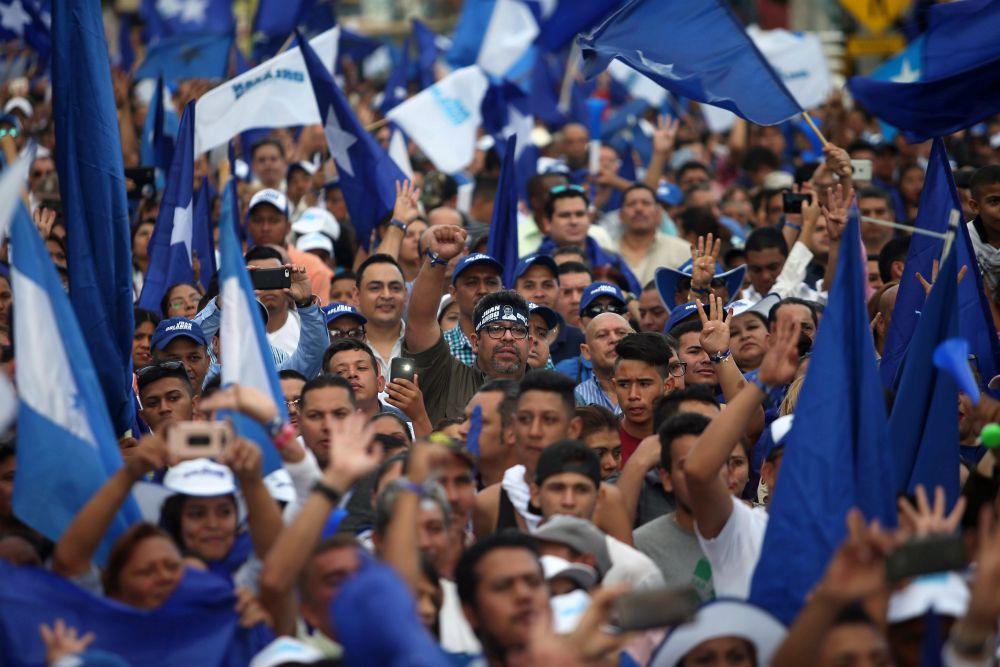
Supporters of Honduran President Juan Orlando Hernández celebrate as they wait for official presidential election results Nov. 28, 2017, in Tegucigalpa, Honduras. (CNS/Reuters/Edgard Garrido)
Is Honduras "returning to the terror in the 1980s"? That's what Dr. Luther Castillo told NCR in an interview. Evidence supports his assertion, and today's terror, just like 30 years ago, has U.S. ties.
Central America was a flashpoint in the Cold War and in the 1970s and 1980s. Honduras was the staging ground for the U.S.-backed covert war against leftists in the region. Honduras was the de facto U.S. military base for Contras fighting the Sandinistas in Nicaragua. Inside Honduras, U.S.-trained military units — most especially the notorious Battalion 316 — carried out a campaign of torture, extrajudicial killing, and state-sponsored terror against Honduran civilians.
Castillo is among Honduran activists now under threat of personal danger because they are calling for new elections, claiming that incumbent President Juan Orlando Hernández and his National Party rigged the Nov. 26 election and then imposed martial law to stifle protests.
All through Election Day and into the next day as ballots were being counted, opposition candidate Salvador Nasralla had a commanding lead. An electoral tribunal magistrate told Reuters Nov. 27, "The technical experts here say that it's irreversible."
But then the shenanigans began. The election tribunal, which is controlled by Hernández's National Party, went mysteriously quiet for 36 hours. Reports of a "computer glitch" spread. When ballot counting resumed, Nasralla's lead had evaporated. Hernández eventually pulled ahead and was declared the winner.
Calling for a new, clean election, Hondurans protested in the streets, watched over by rows of navy, army and police officers carrying riot shields. The government suspended constitutional rights for 10 days and imposed a 6 p.m. to 6 a.m. curfew, arresting anyone, including journalists, who violated it. Before Christmas, squads of police and soldiers cleared blockades set up by protesters in the capital and the countryside. At least 12 people were killed and hundreds more detained at military installations, where they were "brutally beaten," according to human rights experts at the United Nations and the Inter-American Commission on Human Rights.
The Organization of American States has also called for new elections. In a statement issued Dec. 17 after receiving the results of an independent audit of election results, OAS Secretary General Luis Almagro said it was impossible to determine a winner, given that there was "deliberate human intrusion in the computer system; intentional elimination of digital traces; the impossibility of knowing how many times the system was breached; ballot cases open or without ballot tallies; extreme statistical improbability regarding participation levels."
"The only possible way for the victor to be the people of Honduras," he said, "is a new call for general elections."
Advertisement
Despite all this, the Trump administration recognized Hernández as the winner Dec. 22. Days earlier, Secretary of State Rex Tillerson had certified that the Honduran government has been combating corruption and supporting human rights, paving the way for Honduras to receive millions of additional U.S. dollars, including about $17 million for Honduran security forces. The certification ignores cases of government corruption and the assassinations of environmentalists, indigenous leaders and journalists, extensively documented by two major studies last year.
A Carnegie Endowment for International Peace report from May describes Honduras in the center of "transnational kleptocratic networks" and characterizes the Honduran military as "an instrument for the consolidation of power," used to patrol indigenous communities, suppress protests, curtail the exercise of free speech, and "assume a wide variety of domestic security and policing roles."
The London-based watchdog organization Global Witness called Honduras the deadliest place on the planet to be a land or environmental activist. The Hernández government never prosecuted the killers of the country's most prominent activist, Berta Cáceres, who spearheaded efforts to stop the plundering of indigenous lands by hydroelectric, mining and logging interests.
More than 120 activists have been murdered since 2009 when a coup overthrew democratically elected President Manuel Zelaya and ushered in a succession of corrupt right-wing governments that have overseen, according to Global Witness, "shocking levels of violence and intimidation suffered by rural communities."
In a very real sense, the Obama administration — particularly then Secretary of State Hillary Clinton — laid the foundation for Hernández's victory by turning a blind eye to the toppling of Zelaya, who they thought was too close to Bolivian President Evo Morales, Venezuelan President Hugo Chávez and other left-leaning Latin American leaders. By refusing to recognize Zelaya's ouster as a military coup, Clinton kept Honduras on the military aid and training gravy train.
Longtime observers of Central America will know that since the 1980s, nearly 5,000 officers from Honduras have been trained at the U.S. Army's Western Hemisphere Institute for Security Cooperation, or WHINSEC, formerly known as the School of the Americas. Graduates of this school hold key positions in the Honduran government and security forces and have been implicated in numerous coups, human rights abuses and suppression of democracy.
Today, the boogeyman of communism that haunted the region in the 1980s is gone, but the institutions and power centers set up in Honduras decades ago remain entrenched, and now environmental activists and indigenous rights leaders are targeted for threatening the political-economic status quo.
"We know it's the U.S. that runs Honduras," and it is "co-responsible" for the human rights abuses and fatal shootings following the latest presidential election, says Nasralla — who could very well be the legitimate victor in the presidential election.
By legitimizing a stolen election, ignoring the rare Organization of American States call for new elections and refusing to condemn the post-election crackdown by the (U.S.-trained) military, the U.S. is again perpetrating violence that ultimately hurts its own self-interest, but, more importantly, continues the oppression of Hondurans.







